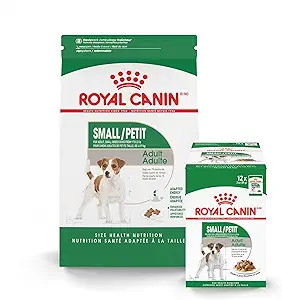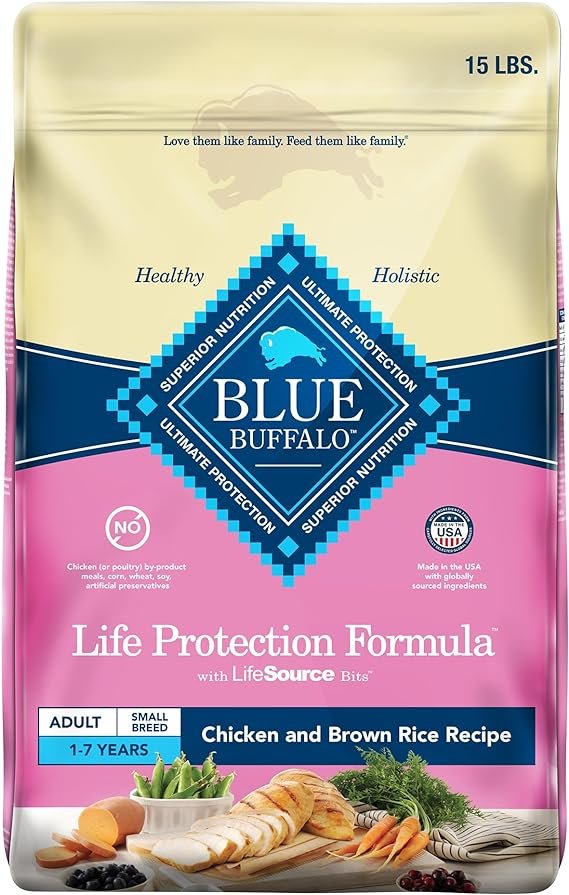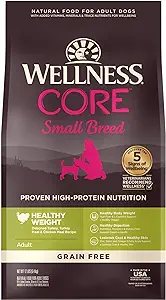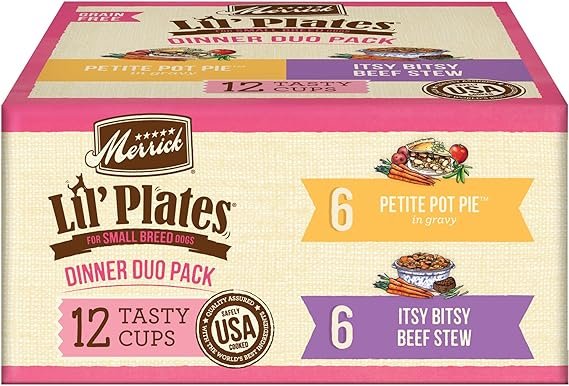Best Dog Food for Small Dogs: A Comprehensive Guide

Best Dog Food for Small Dogs. Choosing the right food for your small dog is crucial for their overall health and well-being. Small breeds have unique nutritional needs that must be met to ensure they stay energetic, healthy, and happy.
Nutritional Requirements of Small Dogs
Small dogs have higher energy needs compared to larger breeds, and their food should reflect this.
High Energy Needs
Small breeds often have faster metabolisms, requiring more calories per pound of body weight than larger dogs.
Essential Nutrients
A balanced diet for small dogs includes proteins, fats, carbohydrates, vitamins, and minerals. These nutrients support their energy levels, muscle maintenance, and overall health.

Importance of Protein and Fat
High-quality proteins help build and repair tissues, while healthy fats provide a concentrated source of energy and support skin and coat health.
Top 5 Dog Foods for Small Dogs
Here are some of the best dog foods formulated specifically for small breeds:
Royal Canin Size Health Nutrition Small Adult Formula
Royal Canin is known for its breed-specific formulas. This particular blend is tailored for small dogs, providing balanced nutrition to support their energy needs.

- Key Ingredients and Benefits:
- Includes chicken meal and rice
- Supports healthy skin and coat with omega-3 and omega-6 fatty acids
- Kibble size designed for small mouths
Blue Buffalo Life Protection Small Breed Formula
Blue Buffalo focuses on natural ingredients and holistic health. This formula is crafted to meet the nutritional needs of small dogs.

- Key Ingredients and Benefits:
- Deboned chicken and brown rice
- Contains LifeSource Bits for antioxidant support
- No artificial preservatives or flavors
Wellness CORE Grain-Free Small Breed Recipe
Wellness CORE offers grain-free options packed with protein and nutrients.

- Key Ingredients and Benefits:
- Turkey and chicken meal
- Grain-free, suitable for dogs with grain sensitivities
- Includes probiotics for digestive health
Hill’s Science Diet Adult Small Paws
Hill’s Science Diet is a veterinarian-recommended brand known for its scientifically formulated recipes.

- Key Ingredients and Benefits:
- Chicken meal and barley
- Supports heart and kidney health
- Contains an antioxidant blend for immune support
Merrick Lil’ Plates Grain-Free Small Breed Recipe
Merrick’s grain-free formula is perfect for small dogs with sensitive stomachs.

- Key Ingredients and Benefits:
- Deboned beef, sweet potatoes
- Grain-free and gluten-free
- High levels of omega fatty acids for skin and coat health
Factors to Consider When Choosing Dog Food
When selecting food for your small dog, consider the following:

Age and Life Stage
Puppies, adults, and senior dogs have different nutritional requirements. Choose a formula appropriate for your dog’s age.
Activity Level
More active dogs need higher calorie content, while less active dogs require fewer calories to prevent weight gain.
Health Concerns and Dietary Restrictions
Consult with your vet if your dog has specific health issues or dietary restrictions to find a suitable food.
Dry vs. Wet Food for Small Dogs
Both dry and wet foods have their advantages.

Benefits of Dry Food
- Helps keep teeth clean
- More convenient and economical
- Longer shelf life
Benefits of Wet Food
- Higher moisture content
- More palatable for picky eaters
- Often higher in protein
Combining Dry and Wet Food
Combining both types can offer balanced nutrition and variety in texture and taste.
Reading Dog Food Labels
Understanding labels is crucial for choosing high-quality dog food.
Understanding Ingredients
Look for whole proteins (like chicken or beef) as the first ingredient, and avoid by-products and fillers.
Checking for Quality and Safety
Choose foods that meet AAFCO standards and avoid those with artificial preservatives, colors, or flavors.
Recognizing Harmful Additives
Beware of ingredients like BHA, BHT, and ethoxyquin, which can be harmful over time.
Homemade vs. Commercial Dog Food
Both homemade and commercial foods have their pros and cons.
Pros and Cons of Homemade Food
- Pros: Control over ingredients, freshness
- Cons: Time-consuming, risk of unbalanced nutrition
Ensuring Balanced Nutrition in Homemade Diets
Work with a vet or pet nutritionist to ensure your homemade diet meets all nutritional needs.
Consulting with a Veterinarian
Always consult your vet before making significant changes to your dog’s diet.
Transitioning to a New Dog Food

Switching foods should be done gradually to avoid digestive upset.
Gradual Introduction
Mix the new food with the old food, gradually increasing the amount of new food over 7-10 days.
Monitoring Your Dog’s Reaction
Watch for signs of digestive upset or allergies and consult your vet if you notice any issues.
Adjusting Portions and Feeding Schedule
Follow feeding guidelines and adjust portions based on your dog’s weight and activity level.
Common Allergies and Sensitivities in Small Dogs

Some small dogs may develop food allergies or sensitivities.
Identifying Food Allergies
Common signs include itching, digestive issues, and ear infections.
Common Allergens in Dog Food
Wheat, soy, corn, and certain proteins like beef or chicken can cause allergies.
Managing Allergies with Diet
Choose hypoallergenic or limited ingredient diets to manage food allergies.
Special Dietary Needs
Small dogs may have specific dietary needs at different life stages.
Weight Management Formulas
For dogs prone to weight gain, choose low-calorie, high-fiber foods to help them feel full.
Senior Dog Nutrition
Senior dogs need lower-calorie food with joint-supporting nutrients like glucosamine and chondroitin.
Puppy Nutrition for Small Breeds
Puppies need high-calorie, nutrient-dense food to support their rapid growth and development.
Conclusion
Choosing the best food for your small dog involves considering their unique nutritional needs, age, activity level, and any health concerns. With the right diet, you can ensure your small dog stays healthy, happy, and full of energy.
FAQs
How much should I feed my small dog? The amount varies based on their age, weight, and activity level. Follow the feeding guidelines on the food package and consult your vet.
How often should I change my dog’s food? You don’t need to change food frequently unless there’s a dietary need or health issue. Stick with a high-quality food that suits their needs.
Are grain-free diets better for small dogs? Not necessarily. Grain-free diets can be beneficial for dogs with specific allergies, but they are not inherently better for all dogs. Consult your vet for advice.
Can small dogs eat the same food as large dogs? Small dogs have different caloric needs and may benefit from food formulated for their size. Kibble size is also a consideration.
How can I tell if my dog likes their food? Signs include eagerness to eat, maintaining a healthy weight, and having good energy levels. If they’re not interested, try a different flavor or texture.




0 Comments